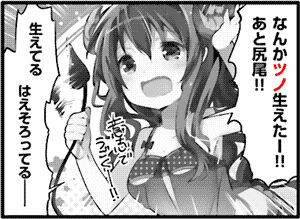There are various ways to say "horn" in Japanese, depending on what you mean.
Animal Horn
The word for an animal "horn" in Japanese is tsuno 角. This includes "horns" in the plural. The word tsuno can also refer to horn-like protrusions in animals, like the tentacles of a snail.
- tsuno ga haeru
角が生える
Horns sprout. (phrase used when something grows horns.)
- Context: Yoshida Yuuko 吉田優子, Shamiko シャミ子, grew horns and a tail overnight.
- nanka tsuno haeta--!!
なんかツノ生えたー!!
Horns sprouted [out]!! - ato shippo!!
あと尻尾!!
[Also] a tail!! - haeteru
生えてる
[They're] sprouted. (literally.) - hae-sorotteru--
はえそろってるー
[They're both] sprouted.- A compound verb from haeru and sorou 揃う, "to complete [a set]," in the sense that horns and tail sprouted as a full set.
- ishi de ugoku--!!
意思で動くー!!
[They] move by will--!! (literally)- In the sense Shamiko can move them like she can move a limb, i.e. they're part of her body.
Note that tsuno 角 is homonymous with kado 角, which means a "corner" of something instead.
Also, "tusks," which also protrude from an animal's head, are called kiba 牙 instead.
- zouge
象牙
Elephant tusks. (from which ivory is made.)
Horned
You can say something has horns sprouting out of their heads or not using the the verb haeru 生える in the te-iru form.
- akuma wa tsuno ga haete-iru
悪魔は角が生えている
Demons [have] horns sprouting [on their heads]. (double subject construction.) - ningen wa tsuno ga haete-inai
人間は角が生えていない
Humans [have] horns not sprouting [on their heads]. - {atama ni tsuno ga haete-iru} hito
頭に角が生えている人
People [who] {[have] horns sprouting on [their] heads}.- {atama ni tsuno ga haete-iru} hito
頭に角の生えている人
(same meaning, no の subject marker.)
- {atama ni tsuno ga haete-iru} hito
Or using existence verbs:
- akuma wa tsuno ga aru
悪魔は角がある
Demons have horns. - ningen wa tsuno ga nai
人間は角が無い
Humans don't have horns.
Names of animals containing the word "horned" in English simply translate to Japanese as compound nouns including tsuno 角. For example:
- tsuno-tokage
角蜥蜴
Horned lizard - tsuno-gaeru
角蛙
Horned frog.- kaeru
蛙
Frog.
- kaeru
Horned girls in anime are called tsunokko 角っ娘. Among them, the ones that are oni 鬼 characters, are called onikko 鬼っ娘 instead.
Anime: Urusei Yatsura うる星やつら (Episode 1, 町に石油の雨がふる)
Hornet
Fun fact: etymologically, "hornet" originates "the one with horns (antennae)." (Proto-Indo-European)[hornet - en.wiktionary.org, accessed 2020-04-30]
Since Japanese isn't an Indo-European language it doesn't translate at all.
- suzume-bachi
雀蜂
Hornet.- suzume
雀
Sparrow. (the bird, not the pirate.) - hachi
蜂
Bee.
- suzume
Horny
Since it has multiple meanings in English, "horny" in Japanese can translate in various ways.
In the literal and unlikely sense of "like a horn":
- tsuno-mitai
角みたい
Like a horn. (e.g. shaped.)- katai
硬い
Hard. (not soft.)
- katai
- kakujou
角状
Horn-shaped.
In the likely and colloquial sense of feeling like doing sexual things:
- monmon to suru
悶々とする
To feel distressed. (normal meaning.)
To feel horny. (other meaning.)- seiteki na fuman
性的な不満
Sexual unsatisfaction. (i.e. to not be satisfied sexually.)
- seiteki na fuman
- koufun suru
興奮する
To be excited. (in the general sense.)- seiteki na koufun
性的な興奮
Sexual excitement. Sexual arousal.
- seiteki na koufun
In the third sense, of something, like clothing, that makes you feel horny:
- eroi
エロい
Sexy. Erotic.
Sign of the Horns
The corna コルナ is a hand gesture signifying horns, and the devil, and the evil, among other things. It looks like this:
Anime: En'en no Shouboutai 炎炎ノ消防隊 (Episode 18)
- Context: Shinra awakens.
- rokku-n-rooru!!
ロックンロール!!
Rock 'n' roll!!
Sound Horn
Conical animal horns were traditionally used to create sound instruments, which were also called "horns."
- tsuno-bue
角笛
Horn-flute.- fue
笛
Flute. (fu ふ becomes bu ぶ due to rendaku.)
- fue
Trumpet
The word rappa 喇叭 is how you say "trumpet" in Japanese.
In anime, most of the time a rappa is involved, it has to do with angels announcing the start of the apocalypse.
Vehicle Horn
Broadly speaking, the term for a vehicle horn in Japanese is:
- keiteki
警笛
Literally "alarm flute."- keioku-on
警告
Warning. Alert. - keikoku-on
警告音
Warning sound. - keionki
警音器
- keioku-on
- keionki
警音器
Warning-sound-device. (typically refers to the ones used in boats.)- Not to be confused keionbu 軽音部, "light music club."
To say that a device is emitting sound, or that someone made the device emit a sound, that is, "to sound a horn," the ergative verb pair naru 鳴る, narasu 鳴らす is used.
- keiteki ga naru
警笛が鳴る
The horn sounds off.
The horn makes a sound. - keiteki wo narasu
警笛を鳴らす
To sound off the horn.
To make the horn make a sound.
Car Horn
Specifically speaking, the term for a car horn in Japanese is:
- kurakushon
クラクション
Klaxon. (katakanization.)- Originally a trademark for a device that emitted an alert sound.[klaxon - en.wiktionary.org, accessed 2020-04-30]
- hoon
ホーン
Horn. (katakanization.)- kuruma no hoon
車のホーン
The horn of a car.
- kuruma no hoon
Siren
The word keiteki 警笛 can means "siren" in Japanese, but some more specific terms include:
- sairen-on
サイレン音
Siren sound.- sairen no oto
サイレンの音
Sound of the siren. (same meaning.)
- sairen no oto
Sirens are used by:
- keisatsu
警察
The police.- patokaa
パトカー
A patrol car.
- patokaa
- kyuukyuusha
救急車
Ambulance. - shoubousha
消防車
Fire engine. Fire truck.
Lastly, the word "siren" can also mean a sea creature in Greek mythology that used its enchanting music and singing voice to attract sailors to their demise. This creature is often conflated with the mermaid.
- seireen
セイレーン
Siren. (creature.)- Also pronounced with a short vowel.
- Note the difference:
- sairen サイレン - device.
- seiren セイレン - creature.
- ningyo
人魚
Person-fish. Mermaid. Merman.



No comments: